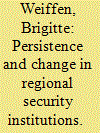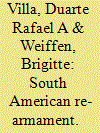|
|
|
Sort Order |
|
|
|
Items / Page
|
|
|
|
|
|
|
| Srl | Item |
| 1 |
ID:
107161


|
|
|
|
|
| Publication |
2011.
|
| Summary/Abstract |
The fact that democracies maintain peaceful relations with each other is regarded as one of the few law-like correlations in international relations, but the causes of this empirical phenomenon remain contested. This paper tries to fill this theoretical gap by attributing the remarkable stability between democracies to inter-democratic institutions. At the same time, it contributes to the debate on the need to differentiate among international organizations in order to assess their peace-building effects. We identify transnational and trans-governmental linkages as crucial features that distinguish inter-democratic from traditional institutions with non-democratic or mixed membership. In order to explain these institutions' peace-building effect, we analyze the impact of international institutions on rivalry mitigation with a view to five pairs of states: France-Germany, Greece-Turkey, Argentina-Brazil, Indonesia-Malaysia, and Japan-South Korea. Those dyads all look back at a history of rivalry, conflict, and mutual threat perceptions, and they are located in highly institutionalized regional settings but vary with regard to their political regime type. The controlled comparison of cases demonstrates that the embeddedness of international institutions in transnational and trans-governmental linkages corresponds to each member's regime type and that these institutional differences are responsible for the varying extent of rivalry mitigation.
|
|
|
|
|
|
|
|
|
|
|
|
|
|
|
|
| 2 |
ID:
074795


|
|
|
|
|
| Publication |
2006.
|
| Summary/Abstract |
The international organisation of the democratic peace matters. Interdemocratic institutions are particularly suited to block escalation pathways between states and to prevent conflicts from resulting in war. This article builds on findings from three fields of research: (a) the liberal analysis of the democratic peace; (b) systemic approaches to international institutions, and (c) new quantitative studies of armed conflicts. Three pivotal contributions of international institutions to peaceful conflict management are identified: international institutions can be used to overcome the security dilemma among states and to tame power competitions. They sustain international cooperation and forestall the recourse of governments to unilateral self-help strategies. Finally, international institutions increase the autonomy of issue areas, which decreases the risk of destabilising spillover effects from other issue areas. The article holds that these three functions are extraordinarily well performed by international institutions composed of democracies and illustrates this allegation by presenting three case studies of interdemocratic management of former rivalries. Therefore, the distinctive features of interdemocratic institutions merit more attention as a supplement to the explanation of the democratic peace.
|
|
|
|
|
|
|
|
|
|
|
|
|
|
|
|
| 3 |
ID:
114826


|
|
|
|
|
| Publication |
2012.
|
| Summary/Abstract |
This article follows the recent trend of bringing the Organization of American States (OAS) back into the debate on regional security, previously dominated by the accomplishments of European institutions and the shortcomings of their Asian and African counterparts. The study of the OAS is advanced here through application of an analytical framework derived from institutionalist theory. A security organization may change its form during its lifetime and pursue different kinds of tasks. The oldest regional security institution, the OAS was designed for collective security. This yielded to collective defence during the Cold War, and to cooperative security in the 1990s. After 11 September it returned to collective defence, but the contradictory reassertion of United States leadership and the emergence of South American regional power made hemispheric cooperation more difficult again. The OAS's main achievement is the extension of essential principles - democracy, human rights, and peaceful conflict resolution - to the entire hemisphere. As a diversified institution addressing a wide variety of security challenges, however, the OAS must find a coherent project alongside more focused sub-regional organizations such as the Union of South American Nations (UNASUR).
|
|
|
|
|
|
|
|
|
|
|
|
|
|
|
|
| 4 |
ID:
129673


|
|
|
|
|
| Publication |
2014.
|
| Summary/Abstract |
Since the year 2000, several South American countries strongly invested in armaments. At the same time, they increasingly resorted to diplomacy and cooperative institutions to maintain peace. This paper establishes a nexus between motivations for re-armament and recent debates on regional security governance and the emergence of regional powers. Most traditional theories have considered armament to be a function of either the perception of external threat or the availability of economic means. In contrast, this article contends that the rise in arms spending cannot be understood without taking into consideration: (a) the coexistence of a stable power balance, security community thinking and practices in regional security governance; and (b) the desire of emerging states to increase their regional or global roles. This analysis emphasizes non-conflict-driven external motives for military procurement as a new and vital determinant, largely neglected in previous research on the region's military spending. Case studies of three major South American spenders, Brazil, Chile and Venezuela, underscore the significance of non-conflict-driven external factors in military procurement. Their experience shows how emergence of regional powers has the potential to offset the contradictions between conventional security logics, as the tendency of states to purchase arms for non-conflict-related reasons equally supports balance of power and security community thinking.
|
|
|
|
|
|
|
|
|
|
|
|
|
|
|
|
|
|
|
|
|